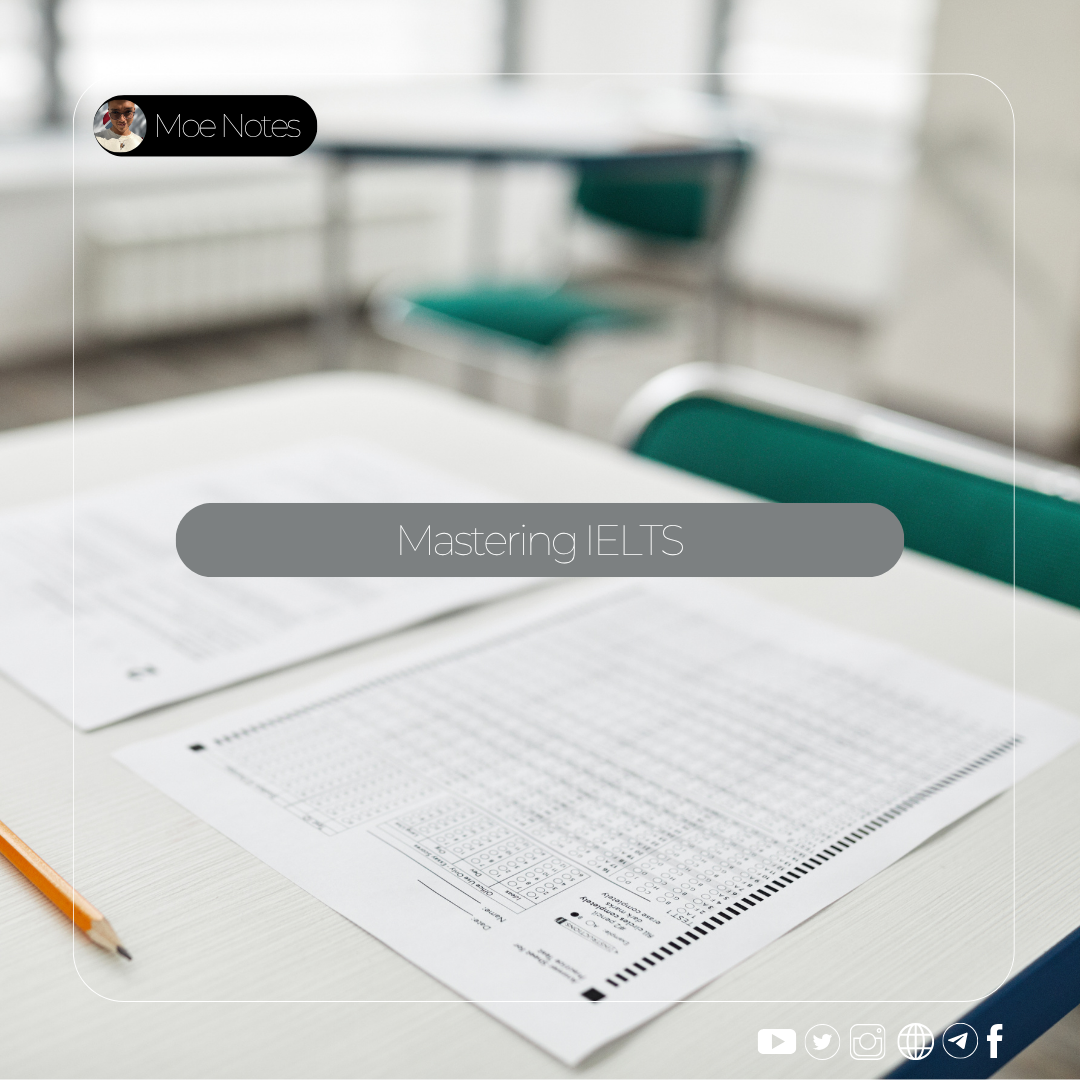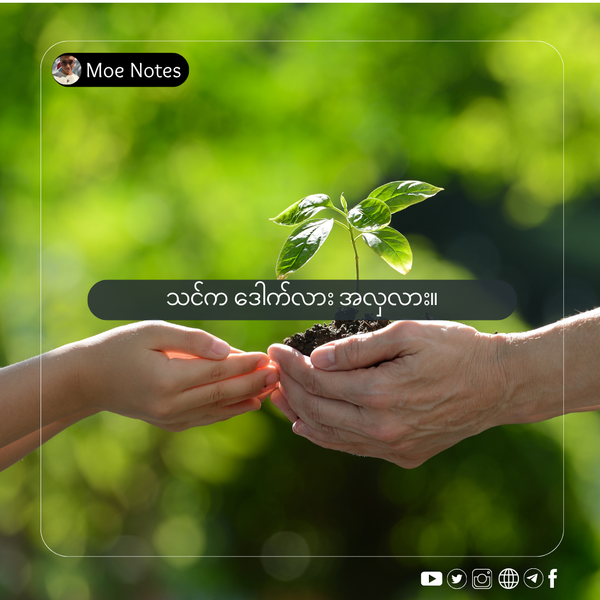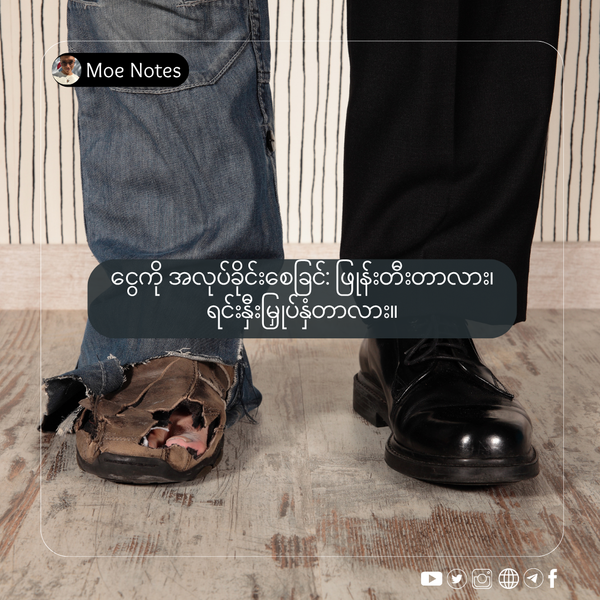Mastering IELTS: The Essential Key to Student Life in the UK

"Stop 'trying' to learn English. 'Trying' implies a separate effort. You don't need a separate effort. You need to make the language a 'necessity' in your life."
This article is also available in [Burmese]
You might be wondering if I’m qualified to write about this topic. I scored a 7.5 on the IELTS, I’ve attended both international and Burmese schools, and I’ve written extensively in both English and Burmese. But none of that is the main reason I’m writing this.
The main reason is that I was once just like you. Even though I attended an English school, I couldn’t speak English properly. When I moved to a Burmese school, my skills got even worse. It was only when I changed my perspective and started seeing this language not as a “subject” but as a “weapon” that everything changed.
Today, I’m not going to talk about study websites or apps. Anyone can find those, and I never really used them myself. What I want to talk about is a fundamental shift in mindset—how to stop seeing IELTS as just another exam and start seeing it as an essential tool for your future, and the practical ways to make it an indispensable part of your life.
Part 1: What is IELTS? - More Than Just an Exam
First, let’s clear up a common misconception. IELTS is not an optional subject you can choose to study. It’s not a degree you can earn.
IELTS (International English Language Testing System) is a standardised proficiency test designed to measure the English language ability of non-native speakers.
Whether you plan to study, work, or immigrate to an English-speaking country like the UK, Canada, or Australia, you must take this exam to prove that you can survive in an English-speaking environment. This is not “optional”; it is a “requirement.”
Part 2: Types and Structure of the IELTS Exam
There are two main types of IELTS tests, and the one you should take depends on your goals.
- IELTS Academic: This is for those who want to pursue higher education (undergraduate or postgraduate). Its Reading and Writing sections are geared towards academic language.
- IELTS General Training: This is for those who are going to English-speaking countries for work experience or immigration purposes.
- IELTS for UKVI: If you are applying for a student visa for the UK, you must take an IELTS test (either Academic or General) at a UKVI (UK Visas and Immigration) approved test centre.
All tests consist of four main parts:
- Listening (30 minutes): You listen to four recordings and answer a series of questions.
- Reading (60 minutes): You read three long passages and answer various types of questions.
- Writing (60 minutes): Consists of two tasks: Task 1 (describing a graph or chart) and Task 2 (writing an essay).
- Speaking (11-14 minutes): A face-to-face interview with an examiner.
Part 3: The Meaning of Band Scores - The Reality Behind the Numbers
IELTS scores are reported on a 9-band scale. Each band score corresponds to a level of English proficiency in the real world.
- Band 9 (Expert User): Has full operational command of the language.
- Band 8 (Very Good User): Has full command of the language with only occasional minor inaccuracies.
- Band 7 (Good User): Can understand university lectures well and participate confidently in tutorials. Can write good academic essays, but may still have some grammatical errors.
- Band 6 (Competent User): Can handle everyday conversations but will likely struggle in an academic setting. It may be challenging to keep up with lectures and express complex ideas clearly in writing and speech.
- Band 5 (Modest User): Can handle basic communication, but is utterly insufficient for university-level education. You might be able to order food in a restaurant, but you will struggle to explain a problem with your accommodation to your landlord.
University Requirements: Most UK universities require an Overall Band of 6.0 to 7.0. However, the “Minimum Requirement” is just that—a minimum. Meeting does not guarantee you a place. In competitive courses with many applicants, the student with the higher IELTS score will always be given preference.
Part 4: The Consequences of a Low Score
What happens if you don’t get a good IELTS score?
- Pre-sessional English Course (ESL): If your score is just below the requirement (e.g., you got a 6.0 when a 6.5 was required), you will likely have to attend a Pre-sessional English for Academic Purposes (EAP) course for 6 weeks to 3 months before your main course starts. This will cost you extra money and extra time.
- Rejection from the University: If your score is significantly below the requirement, your application will be rejected outright.
- The Real-Life Exam: This is the most crucial point. Let’s say you are lucky enough to scrape by with a passing score, and the university accepts you. In real life, you are setting yourself up for a struggle. You will have to fight to understand lectures, participate in tutorials, write assignments, and even order food. Every day in the UK will become a stressful burden rather than an enjoyable experience.
Part 5: IELTS and Scholarship Opportunities
This is a common misconception. Can a high IELTS score get you a scholarship? No. Most scholarships are based on your academic merit and your experience in your chosen field. IELTS is a prerequisite you must meet to be considered for a scholarship; it is not a "golden ticket” that will win you one.
Part 6: Shifting Your Mindset - From a Skill to a Tool
The first step to improving your English is to change your mindset.
Stop seeing English as a “Skill” and start seeing it as a “Tool.”
- A Skill: This is a “nice-to-have.” For Example, painting or playing a musical instrument. Not everyone needs it.
- A Tool: This is a “must-have.” Just as you need a hammer and a saw to build a house, in today’s world, you need the “tool” of English to develop your life, to seek knowledge, and to connect with the world.
You don’t "try” to learn how to use a hammer. When you need to drive a nail, you pick it up and use it out of necessity.” You must treat English the same way.
Part 7: Practical Methods - Weaving English into Your Life
To stop “trying” and start “needing,” you must weave English into your daily activities, so that it doesn’t require extra time.
- Do you love to cook? Instead of watching cooking tutorials in Burmese, subscribe to channels like Made with Lau, Max the Meat Guy, or Nick DiGiovanni. Read recipes in English. You’ll learn what “Foie Gras” is naturally.
- Are you interested in tech? Listen to videos from tech reviewers like Mrwhosetheboss or Ali Abdaal. Their fast-paced speech will significantly improve your listening skills.
- Do you use your phone every morning? Instead of just reading the news, subscribe to a newsletter from a productivity guru like Tiago Forte.
- Do you love watching movies? Watch them with English subtitles instead of Burmese ones. Eventually, try to watch them with no subtitles at all.
- Do you like reading the news? Make it a habit to read about one topic you’re interested in (e.g., cameras, celebrities) in English every day on an app like Apple News.
These methods will make English a part of your life without requiring extra time, and you’ll learn while doing things you enjoy.
Part 8: Facing Your Fear
From my experience taking the IELTS and helping a friend with the Duolingo test, I’ve learned one thing: no exam can 100% measure your English ability.
- Fear the Fear Itself: If you are nervous during the speaking test, the examiner will assume you can’t speak, not that you’re just scared. You have to “show” what you know.
- Be Open-minded: If someone tells you your pronunciation isn’t good, accept it and improve. But if they are making fun of you, ignore them. Being fluent in Burmese is also a skill.
- Accept Your Current Level: Acknowledge that you are not yet fluent in English. Then, start trying from that level. Age doesn’t matter.
Part 9: The Best Online Resources for Students in Yangon
I know that good books and libraries are scarce in Yangon. But luckily, the best resources are right in your phone.
- Official Sites (Must-visit):
- IELTS Official Website: Has exam formats, scoring guides, and free practice tests.
- British Council - Learn English: Has free exercises for everything from grammar to vocabulary.
- YouTube Channels (Free Tutors):
- E2 IELTS: Explains exam strategies in detail.
- IELTS Liz: Famous for simple and easy-to-understand lessons.
- Practice Test Sites:
- IELTS Online Tests: Many websites offer mock tests in the real exam format.
- General English Improvement (For Daily Life):
- BBC Learning English: Learn English through daily news.
- TED Talks: Listen to experts talk about topics you’re interested in with English subtitles.
Conclusion
In the end, IELTS is not a terrifying obstacle. It’s a weapon that you must master. It’s the first step in proving that you are ready not just to “survive” in the UK, but to “thrive.”



